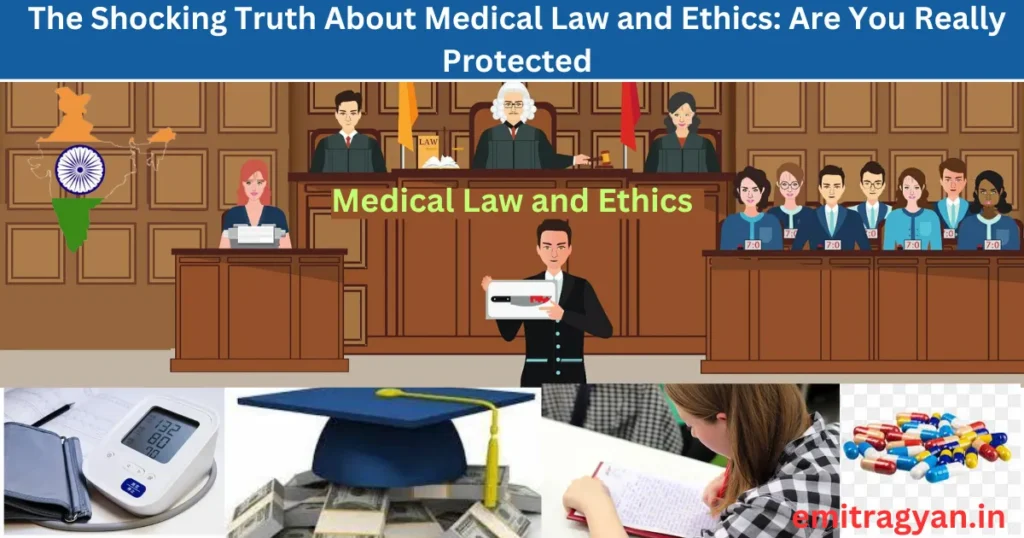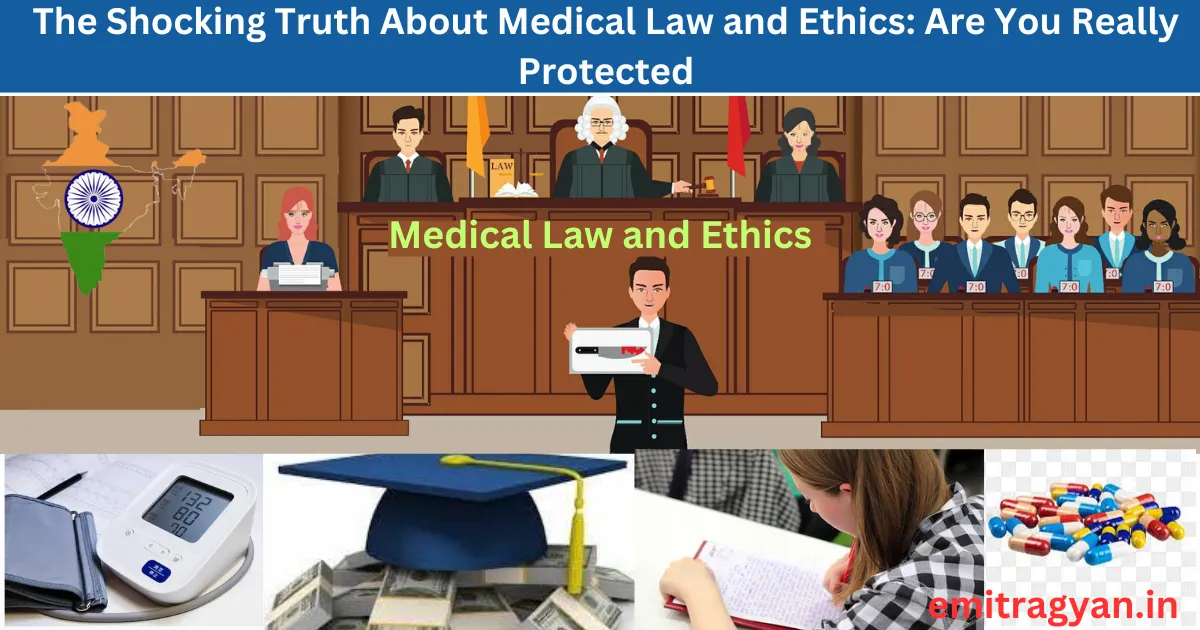Welcome, readers! Today, we’re diving into the topic of medical law and ethics. Since healthcare and medicine are deeply intertwined with human life, this field brings about both critical importance and sensitivity. Along with their medical expertise, healthcare professionals must also adhere to ethical principles and legal guidelines. Medical law and ethics provide a framework for how those in the healthcare industry should integrate both legal and moral responsibilities into their practice. I encourage you to read this blog in its entirety to gain a deeper understanding and a thoughtful perspective on the role of ethics and law in healthcare.

Medical law
Medical law refers to the set of regulations that outline the rights, duties, and responsibilities of healthcare professionals, as well as the rights of patients. These laws establish clear guidelines for doctors, nurses, hospitals, and other medical institutions to follow. The main goal of medical law is to ensure that healthcare providers carry out their duties with care and avoid negligence. Here are some key aspects covered under medical law:
- Patient Rights: Patients are entitled to receive appropriate treatment and have their health information kept confidential. They also have the right to make their own treatment decisions, whether to accept or refuse it, which is known as “informed consent.”
- Medical negligence: If a healthcare provider or facility fails to provide proper care, resulting in harm to a patient, they can be held legally liable. This is called “medical negligence.”
- Privacy and Data Protection: Doctors and hospitals have a legal obligation to keep patient information confidential. Any unauthorised use or disclosure of this data can lead to legal consequences.
- Emergency Services: It is both a legal and ethical duty for healthcare providers to offer emergency medical care. Failure to do so, especially if it leads to the patient’s death, can result in legal action against the responsible medical professionals.
This set of laws ensures that healthcare is delivered with a focus on safety, patient rights, and ethical conduct.
Read this also :- Everything You Didn’t Know About Court Marriages: Documents, Process & More
Medical ethics
Medical ethics refers to a set of moral principles and guidelines that healthcare professionals follow to navigate their responsibilities and make ethical decisions in their practice. These principles help professionals differentiate between right and wrong, ensuring that patient care is always the top priority and human dignity is respected.
The core principles of medical ethics include:
- Autonomy: Everyone has the right to make their own decisions about their healthcare. This means that patients should have full information about their condition, treatment options, and potential risks so they can make informed decisions.
- Beneficence: The primary goal of healthcare providers is to improve the health and well-being of their patients. This principle emphasises that medical professionals must always act in the best interest of the patient.
- Non-Maleficence: “First, do no harm” is a fundamental ethical principle. It means that healthcare providers should avoid causing any harm or injury to the patient, whether through action or inaction.
- Justice: The justice principle is a focus on fairness and equality in healthcare. All patients should have equal access to medical services without any discrimination or bias.
These ethical guidelines ensure that healthcare professionals provide care that is compassionate, respectful, and centred on the patient’s well-being.
relationship between medical law and ethics
The relationship between medical law and ethics is deeply interconnected. While medical laws are legally binding and enforceable, ethics provide a moral framework for healthcare professionals to follow. Ethics guide professionals to make morally sound decisions, and in turn, medical law helps enforce these ethical standards. In many cases, ethical principles enhance the reach of the law, while the law ensures that the highest ethical standards are maintained and upheld within the medical field. Together, they ensure that healthcare practices are both legally compliant and morally responsible.
medical law and ethics in India
In India, medical law and ethics are upheld through various statutes and guidelines aimed at regulating healthcare practices and ensuring ethical conduct. Some of the key laws governing the medical field include:
- Indian Medical Council Act, 1956: This Act established the Indian Medical Council to oversee medical education and the registration of medical professionals. It also ensures that healthcare providers adhere to ethical standards and maintain proper conduct.
- Consumer Protection Act, 1986: This law grants patients the right to file complaints against negligence or improper treatment by healthcare providers, safeguarding patient rights.
- Clinical Establishments Act, 2010: This Act regulates hospitals and clinics, requiring them to meet certain standards in order to provide adequate medical care and services.
- Transplantation of Human Organs Act, 1994: This law governs the ethical and legal aspects of organ donation and transplantation, ensuring that the process is conducted fairly and transparently.
- Medical Termination of Pregnancy Act, 1971: This Act balances ethical and legal considerations in cases of abortion, prioritising the health and decision-making rights of the woman involved.
These laws work together to ensure that healthcare in India operates within both legal and ethical boundaries, protecting patient welfare and maintaining professional integrity.
Ethical and legal challenges
Ethical and legal challenges are common in the field of medical law and ethics, and several key issues frequently arise:
- Limited Access to Treatment and Resources: In a country like India, where healthcare services are not always accessible to all, ensuring equal access to medical care is a significant challenge.
- Ethical Dilemmas: Healthcare professionals often face situations where ethical and legal considerations may conflict. For instance, in cases of severe illness, deciding whether to continue or withdraw treatment can create complex ethical and legal dilemmas.
- Privacy and Data Security: Protecting patient information is a major challenge in today’s healthcare system. The risks of data breaches and the need for strong cybersecurity measures are ongoing concerns.
- Technology and Ethics: As medical technology advances, new ethical questions arise. The use of artificial intelligence (AI) and robotic surgery, for example, brings concerns regarding patient privacy and security that must be addressed.
These challenges highlight the need for a balanced approach to uphold both legal and ethical standards in healthcare.
conclusion
In conclusion, adhering to medical law and ethics is essential for healthcare professionals. It not only ensures patient safety but also fosters trust and respect in the medical profession. In a country like India, with its diverse and complex healthcare system, it becomes even more crucial for medical professionals to follow these ethical and legal standards. By doing so, they help preserve the integrity of the medical field and ensure that patients receive the care they deserve.
Important questions of Medical Law and Ethics
What is Medical Law?
Medical law encompasses the regulations governing the medical profession and various healthcare-related issues. It addresses the rights of both doctors and patients, as well as matters such as medical negligence, confidentiality, medical research, and medical decision-making
What is Medical Ethics?
Medical ethics refers to the moral principles and guidelines that healthcare professionals are expected to follow in their practice. The core principles of medical ethics include:
Autonomy: Respecting patient rights and their ability to make informed decisions.
Beneficence: Prioritising the well-being of the patient.
Non-maleficence: Ensuring no harm is done to patients.
Justice: Providing equitable treatment to all patients.
How Important is Patient Consent to a Doctor?
Informed consent is crucial in medical procedures. It ensures that patients are fully aware of the procedure, its risks, and alternative treatment options, allowing them to make their own choices. Performing any treatment without consent is both legally and ethically unacceptable.
What is Medical Negligence?
Medical negligence occurs when a healthcare provider fails to fulfil their responsibilities, resulting in harm to the patient. This breach of duty can lead to legal action against the provider.
What is the Importance of Confidentiality in Medical Law?
Confidentiality in medicine means that a patient’s medical information must be kept private. Doctors are not permitted to disclose this information without the patient’s consent, except in certain legal circumstances. Breaching this confidentiality can lead to legal repercussions.

Good content
thanks